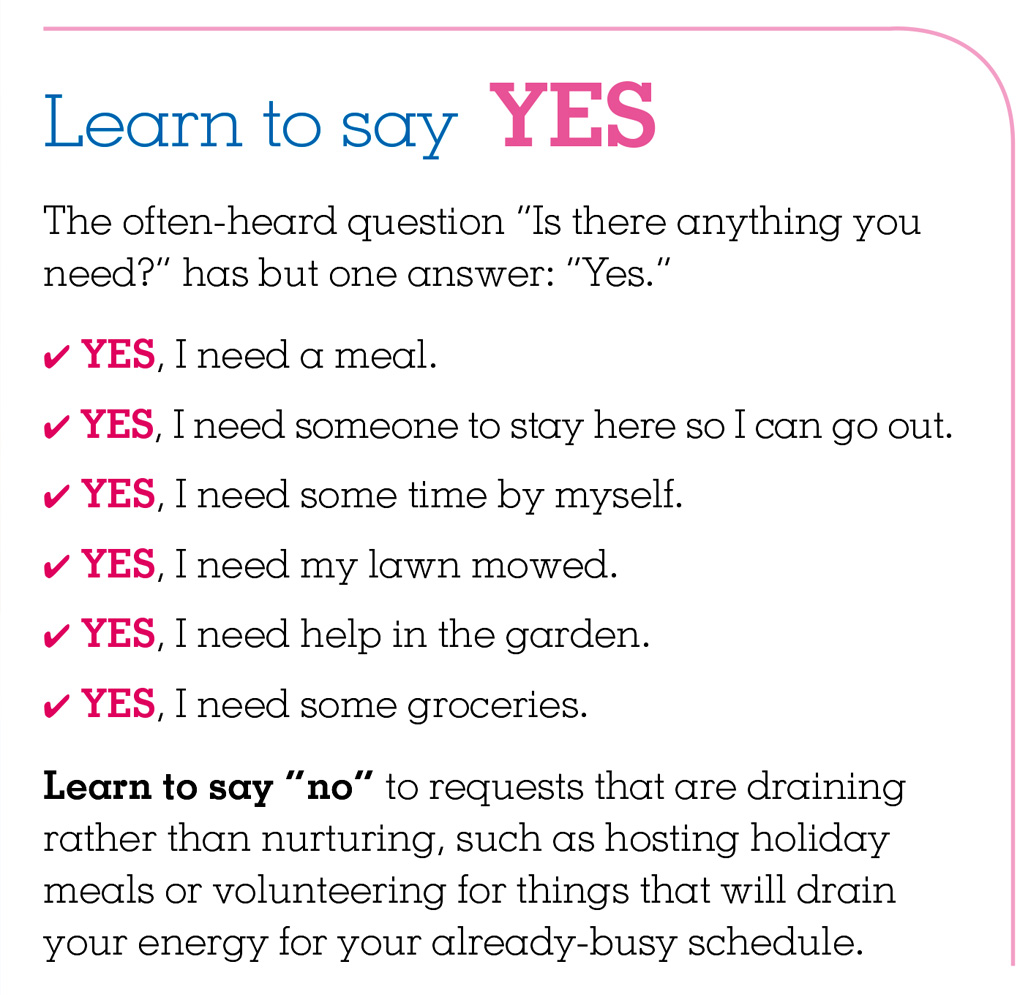 Providing care for a family member in need is a centuries-old act of kindness, love and loyalty. Caregivers, friends and family members can make an incredible difference in the lives of their loved ones who are diagnosed with chronic conditions.
Providing care for a family member in need is a centuries-old act of kindness, love and loyalty. Caregivers, friends and family members can make an incredible difference in the lives of their loved ones who are diagnosed with chronic conditions.
As a caregiver you provide help with many things, including grocery shopping, house cleaning, cooking, shopping, paying bills, giving medicine, toileting, bathing, dressing and eating. There are many rewards and challenges to providing care. There are times of intimacy, fun and laughter. In fact, research has found that caregivers feel approximately three times more positive than negative emotions related to caregiving. The literature reports some of the following statistics and comments:
• 96 per cent of caregivers report feeling “loving”.
• 90 per cent report feeling appreciated.
• 84 per cent report feeling proud.
Doing it with love
Caregivers often experience increased closeness with their loved one; they can find it meaningful to care for someone and often report having a sense of purpose. Caregiving can help clarify an individual’s beliefs and deepen their sense of their own values, compassion and patience, and improve their self-confidence and self-esteem. It can also create a positive psychological change as a result of successfully struggling with a highly challenging situation.
There are also times of sadness, frustration and exhaustion,  however, which are often caused by a lack of practical skills and support: Caregivers often have to travel through a healthcare system that, unfortunately, is not designed to manage chronic long-term illnesses. That means struggling to coordinate doctors, managing multiple prescriptions, monitoring for changes in conditions and more. Studies have shown that caregivers are nearly twice as likely as the general population to develop multiple chronic illnesses due to stress and neglect of their own health and well-being.
however, which are often caused by a lack of practical skills and support: Caregivers often have to travel through a healthcare system that, unfortunately, is not designed to manage chronic long-term illnesses. That means struggling to coordinate doctors, managing multiple prescriptions, monitoring for changes in conditions and more. Studies have shown that caregivers are nearly twice as likely as the general population to develop multiple chronic illnesses due to stress and neglect of their own health and well-being.
Caring for another person takes a lot of time, effort and work. In addition, most caregivers juggle caregiving with full-time jobs and parenting and, in the process, put their own needs aside. Caregivers often report that it is difficult to look after their own health in terms of exercise, nutrition and doctor’s visits, and can often end up feeling angry, anxious, isolated and sad.
Manage together
Deciding how to manage any kind of medical condition with your loved one is an important task. Things to consider include understanding your loved one’s goals, making sure you talk with your loved one, tag-teaming appointments with others, developing a health journal, helping to maintain a safe home environment and improving your own comfort.
Understand your loved one’s goals
Talk with your friend or loved one with chronic illness to help understand their goals. Get the conversation started by discussing events or activities they used to participate in and miss, whether that is fishing, walking the dog or playing cards, or something they would like to be a part of in the future. You can help your loved one meet their goals by discussing them with their healthcare providers, doctors or community service agencies.
Talk with, not at, someone
Your family member or friend may be put off by your advice if they think that you are speaking at them and not with them. Most people suffering from a chronic illness do not want advice; they want to talk things out so that they can come to their own decisions. At times, giving advice inhibits conversation. Put yourself in their shoes and talk in a way that encourages a positive reaction. For example: “I read that some people suffering from heart failure have trouble checking their weight every day. We could make a pact to make sure we weigh ourselves daily.”
Tag team
Attending doctor’s appointments with the “patient” can not only be comforting to them, but also provides a second pair of ears.
Hint: Take all medications (in their containers) along to doctor’s appointments. It is also helpful to write down questions ahead of time and take notes. You could also help create a personal health journal with doctors’ numbers and a record of your loved one’s weight, oxygen use and symptoms, such as increased shortness of breath or fatigue.
 By educating yourself about your loved one’s condition, you will feel more comfortable speaking about it and reinforcing doctors’ suggestions.
By educating yourself about your loved one’s condition, you will feel more comfortable speaking about it and reinforcing doctors’ suggestions.
Make sure the home is safe
Look for things in the environment that might cause harm to your loved one, such as loose area rugs, wonky steps or missing/faulty handrails—all of which can be dangerous for someone who has trouble walking. Stairs can cause shortness of breath, so think about moving your loved one’s bedroom to the ground floor if you live in a multi-storey home. Place chairs around the house so that your loved one can sit if they need to.
How to take care of yourself
It is very important that you don’t neglect your own needs. While it may feel selfish, looking after yourself really is the best thing you can do not only for yourself but also for the person you are caring for.
Find friends and family that you can lean on for emotional support, or join a local disease-specific support group composed of other people in the same situation as you. You can also:
• Make sure you have regular check-ups and that those “little concerns” about your health are seen to.
• Keep exercising: Exercise is more important than ever as it gives you a break, combats depression and helps you maintain your health.
• Eat properly and get enough sleep.
Don’t go it alone
Find community resources and ask friends or family members to step in and give you time off. Or, if you are financially able, hire someone to assist you.
When you have a break, get your hair done or see a movie. Listen to music and exercise. In addition, meditation can be very helpful.
Excerpted with permission from Pulmonary Hypertension Association of Canada, with contributions from Maureen Tymkow, PH caregiver, and Carolyn Doyle-Cox, RN.
Visit phacanada.ca for more information.













